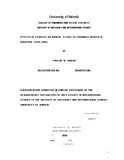| dc.description.abstract | Women are not strangers to conflict. They have witnessed the direct impact of conflict on their
families, friends and the community. Women have been abducted, raped in camps, forced into
prostitution, gang raped and infected with HIV/AIDS Stories of these horrors have been narrated
and repeated worldwide from Palestine, Democratic Republic of Congo, Rwanda, Darfur and in
south Sudan. Pain, trauma and psychological effects on conflict on women and children leave deep
pains that cannot be erased in a lifetime. Conflict based on political, social, economic and religious
causes have far reaching effects on women and their gender. Violence meted against women in
conflict situations is meant to break and humiliate women, families and their communities, no
matter which side of conflict they are on. Women have become the greatest victims of conflict, and
the biggest stakeholders of peace.
This dissertation examines the effects of conflict on women from south Sudan in diaspora in
Kenya. The women have been forced into diaspora by conflict in Sudan, whose root causes lie on
the political, socio- economic and religious dimensions. Political turmoil has been a permanent
aspect of Sudanese life since it gained independence from the British administration. Indeed,
colonially created ethnic, religious and regional divisions undermined the unity of Sudanese state
from its early beginning.
The dissertation had focused on diaspora, looking at the transformation of gender roles and
identities in conflict situations and in the diaspora. People's identities in diaspora can be regarded
as a constant process of negotiation between traditions of their homeland and those of host
countries. The women are the ones who hold families and communities together during the worst
of the fighting, in their country or even in the diaspora.
The dissertation has therefore looked at the role_women are playing in peace building and
. reconstruction efforts that must not only be supported, but also recognized. Failure to include
women in the peace processes will only undermine their gender roles in conflict management, but
also fail to yield success. Indeed, women are the majority of those affected in the conflict; hence
they should be consulted in all conflict management, peace building process and post conflict
situations. 'Women hold half-of-the world" | en |

